- Learn The Inside Story From One Of The Members Of The MIT Blackjack Card Counting Team
- Find Out How Statistics From Blackjack Card Counting Can Help You In Business
- How To Use Analytics Rather Than Emotions To Make Better Decisions
Full Interview Audio and Transcript
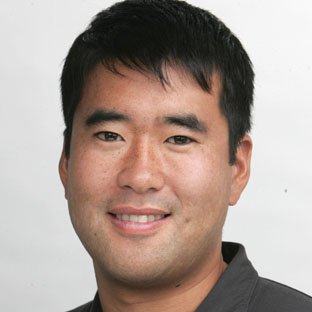
Personal Info
Sports Teams: Red Sox, Patriots, Celtics, All the Boston teams
Favourite Books:
- Fortune’s Formula: The Untold Story of the Scientific Betting System That Beat the Casinos and Wall Street by William Poundstone
- Moneyball: The Art of Winning an Unfair Game by Michael Lewis
- When Genius Failed: The Rise and Fall of Long-Term Capital Management by Roger Lowenstein
Favourite Entrepreneurs: Mark Zuckerberg from Facebook, Larry Page and Sergey Brin from Google, Neil Robertson
Twitter: http://twitter.com/jeffma
Personal Blog: http://houseadvantageblog.com
Interview Highlights
This is a condensed audio transcript. The full source audio is provided if needed. The interviewee may post corrections in the comments.
Adrian Bye: So, today, I’m talking with Jeff Ma, who has done some pretty interesting stuff, who is the main inspiration behind the movie around the MIT students that beat the Vegas casinos in blackjack. He started an Internet company and is currently publishing a book around using statistics to make that a sensation. So, Jeff, thanks for joining on the call.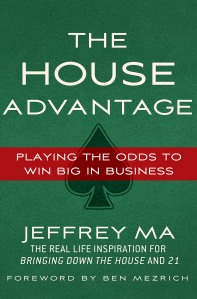
Jeff Ma: Thanks for having me.
Adrian Bye: Why don’t you want to just go ahead and tell me a little bit about yourself and who you are, and maybe summarize what you’ve been doing a little better than what I can.
Jeff Ma: Sure. Well, I guess I’ve done a lot of different things. I mean, I’ve been an Internet entrepreneur for the last, let’s say almost 13 or 14 years. I graduated from MIT in 1994 and went into the world of finance for a couple of years, but never really took on to that. I mean, my professional career has sort of been all about entrepreneurship.
But, behind that, during that whole time from the time I was a senior in college until about 2001, I was a professional card counter. I played blackjack using statistics and numbers and data to beat the casinos legally. And we did quite well during that timeframe, winning somewhere in the neighborhood of about five million dollars a group. And it was sort of like a summer job kind of thing, or a hobby. But, we spent a lot of time on it, and we treated it very much like a business.
And then, in 2001, when it was all over, I approached a writer who was a friend of mine by the name of Ben Mezrich. He had written about six books before and had never written anything of this genre and I approached him and said, “Hey, I’ve got a great story for you. I’ve got a great idea for your next book.” And we wrote “Bringing Down the House” together, which became a New York Times bestseller and then was the inspiration for the movie “21,” which came out and was a blockbuster. It made $150 million.
Adrian Bye: Why would you stop? There’s obviously a limit to how much card counting you can do since you get kicked out of casinos, right?
Jeff Ma: Yeah, there is. I mean, basically what happens is that when you count cards, it’s not something that’s very hard for the casinos to figure out that you’re doing it. So, it’s not like there’s a ton that you can do to trick them into thinking that you’re not counting cards. So, no matter how good you are, it only lasts for a certain amount of time. And for us, for me personally, it only lasted about seven years.
So, there were a few reasons that I stopped playing. One, it became harder and harder to play. And two, as amazing and as fun of an experience as it is, there’s other things in life that I really wanted to move on to. And certainly focusing more on my entrepreneur experience and building companies was something that I was much more focused on and wanted to spend more time on.
Adrian Bye: So, you’re saying even if you could continue to make a good income through card counting, you would rather just stop that over time anyway and be an entrepreneur just because it’s more fulfilling?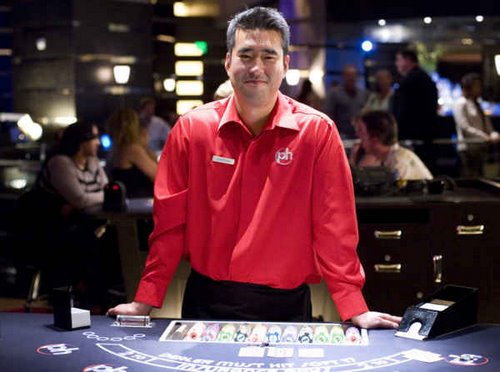
Jeff Ma: Yeah. I mean, I think so. And also, it’s more lucrative in the end. Like blackjack was very lucrative and very fun, but you think about it and you’re making small amounts of money. Our advantage over the casino is about two percent. And one of the lessons that I try to get across in my new book “The House Advantage” is that your advantage over the casino or your advantage in life when you use statistics is small.
So, what you want to try to do is get a large sample size or a large amount of time or a large amount of trials to realize that small advantage. Now, in blackjack, again, let’s say our advantage is two percent of every dollar we put on the table. Well, you need to be betting lots of money and you need to make lots of bets for that to become a lucrative operation.
Adrian Bye: So, in the end, it became more like work rather interesting and then running a lot of money through which was then also attracting attention from the casinos.
Jeff Ma: Well, you know what? I mean it was always a lot like work. I mean I think that one of the things that the book and the movie tried to sort of do is make it seem much more glamorous than it is. I mean, there was certainly glamour. I mean we were staying in two floor suites and with pool tables and their own private pools, and all that kind of stuff, and we were limo’d all over. And that of stuff was glamorous for sure.
But, the actual part of playing blackjack, we were there to make money, so it was very much like work. And it is a little bit of a grind. I mean, you’ve got to sit at that blackjack table for a long time and you’re not there to have fun, you’re not there to have drinks, you’re not there to go party with your friends. You’re there to make money.
Adrian Bye: What were some of the most fun moments that you had?
Jeff Ma: I think when you play, when you get to play blackjack with celebrities it’s pretty fun just because oftentimes you’re bettering a lot more than they are. So, they become, it almost like switches things on them where they become much more interested in you than you are in them. They want to know like what you do and how did you get so much money and all that kind of stuff. And certainly that’s a lot of fun.
Adrian Bye: And you were betting all that money and you were what, like 27 or 28 or something, right?
Jeff Ma: Yeah, I was probably 26.
Adrian Bye: So, you did your card counting. It became a book, it became a movie, and that kept you busy for a while. And then you went and you started an Internet business.
Jeff Ma: Yeah. I mean I’ve done a variety of things in the Internet world. The first company I started was an online golf instructional website. So, we actually had seven of the top 15 and 15 of the top 100 golf instructors signed up to exclusive contracts to basically provide us with 30 to 90 second online video tips.
But, this was a group company we started in the late ’90s, so it just was a horrible time to be starting a company of that type, sort of a content play around video. If we had started it earlier or now, it probably would have been in a better position. But, we eventually sold that business to Demand Media.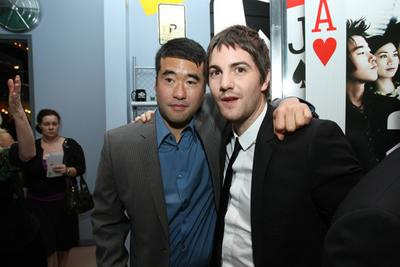
The second business that I started was a company that did in the personal finance phase. So, the current company called Circle Lending, and what we did there was allowed people to make loans between family and friends. So, if you wanted to lend money to someone you knew and wanted to make it legally binding, set up a promissory note and a payment schedule, we would handle all that for you. That company, we had a little bit of success with and then eventually sold it to Richard Branson at Virgin.
And then the last company I started was a company called Citizen Sports. Originally we started it as Protrade which was a new media business in sports, sort of a new game, a new community built around the concept of an athlete stock market. So, buying and selling athletes just like they were stocks.
We also had a lot of notions in that business of trying to introduce the concepts of advanced statistics or analytics within sports and trying to expose them to people in a mainstream media way. That company for about three years had some level of success, but we were concerned about how big it would ever become.
So, we actually course corrected or changed quite a bit and became a company called Citizen Sports. It was all the same people and we still had some of the assets from the Protrade work. And the Citizen Sports company was basically a new media business in sports all built around distributive platforms. So, we were the top sports provider on Facebook, really the top sports provider on the iPhone and on the Android. And that company we sold about three months ago to Yahoo!
And I read an article once when I was young, when I was like thinking about becoming an entrepreneur, that basically said the real entrepreneur, the great entrepreneurs kind of change the world. They do something that changes the world. And I guess I’ve always wanted to do one of those businesses that fundamentally changes the way people do things. And I don’t think I’ve really necessarily done that yet, so maybe that’s, to me, going to be the mark of having really succeeded in something.
Adrian Bye: Are you going to keep taking swings at it until you get it in figuring out that?
Jeff Ma: I mean, yeah. I mean, the thing is like in terms of my new book, and one of the things that I hope it does is, it changes the world to some degree by giving access to information and to knowledge to people about statistics and whatnot, that wouldn’t read a book like this. The world of statistics and numbers and data, that’s been written about quite a bit.
And certainly there’s a big movement going on right now where lots of people are talking about it, writing about it, obviously Michael Lewis and “Moneyball” and whatnot. The ideas of how to use it in your life, how to use it in business, how to make better decisions. A lot of the stuff that’s been written there has been heavily academic and has been difficult to get to a mainstream audience.
And you don’t want that. You want the mainstream audience able to read the stuff so they can be the ones thinking about, ‘Well, how in my life, in my job, can I improve our processes by using data and analytics, even if I’m not a math major or I can’t sit behind a spreadsheet and do a linear aggression?’ I want to get that message out to people in a way that’s very interesting, in a way that you know they’ll read. Like they’ll basically read about gambling and sports stories, and won’t even realize that they’re reading a book about statistics.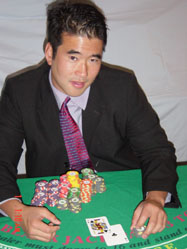
From that chapter in my book, one of the greatest lessons is just this concept that if you are a leader in a business, you cannot surround yourself with people that are just going to agree with you. And you need to seek information potentially that disagrees with whatever notion or whatever theory you have because that’s the best way for you to be objective. And oftentimes the best way to do that is to have a real analytical approach where you look at data, you look at statistics, you look at information to make decisions rather than just relying on anecdotal information from a few people that you know are going to agree with you.
Adrian Bye: So, would you not agree with the devil’s advocate approach? You more just want to have as much facts as you can.
Jeff Ma: Yes, I would say so. I mean, now I’ve never thought about it like that, but the reality is that I don’t like people dissenting just to dissent. I mean, it depends on what part of the process you’re in. If you’re in the creative process, I don’t think the devil’s advocate is good. But, when you’re ultimately making a decision on what to do and what not to do, having dissenting viewpoints is certainly helpful.
But again, at the end of the day, if you can have things backed by data and backed by real analytics versus just someone’s opinion, you’re always going to end up with better decisions.
Adrian Bye: And I guess what I’m interested, where I’m driving with this is, I’m interested to understand how the stat background, that you talked about being very important what you learned at MIT and then you’ve been in card counting at the casinos, how that helped you do some things better in your job at say Citizen Sports.
Jeff Ma: I think that the card counting lessons from that make me better at Citizen Sports, really hinge around not so much necessarily the numbers as much as they hinge around just sort of the teamwork aspect of it, the trust aspect of it.
I think one of the things that you learn when you’re a card counter is how important trust is because you’re giving hundreds of thousands of dollars in cash to people, sending them to Vegas with it and telling them to make you some money. And for you to be successful doing that, you really have to trust the person that you’re involved with. And I think about that as a very base level of trust, like trust in their integrity which is the first level of trust.
But then, as you think about us and how we function as an organization, having different people at different tables collecting the information that enough then one person like myself coming in and betting the big money. That type of thing I need to rely on the person on my table or the people on my team to be doing their job correctly. If they’re not doing their job correctly, then I absolutely can’t be successful in how I’m doing it.
And I think that that’s very similar to when you’re an entrepreneur. When you start, it’s two of you guys and you do everything yourself and then once you start growing, you grow and grow and grow. And then you’ve got to trust people to effectively do their job correctly below you, otherwise you can’t grow as an organization.
Adrian Bye: I’m interested, you know, you’re talking about that the main examples rather than any of the stat stuff and driving business towards using facts and stats rather than emotion. Is it that trust issues have turned out to be more important for you?
Jeff Ma: It’s funny because there’s two sets of lessons that I learned from the blackjack stuff. The first I would say they call that the soft business lessons. And I don’t talk about those as much in my book. And then there’s the hard business lessons, and the hard business lessons are the lessons that are around data and analytics and using data and analytics to make better decisions and whatnot.
I mean, how we used that at Citizen Sports certainly was, because we’re on the Internet, we have tons of information that we get. We’re gathering constantly about users, what pages they’re viewing, where are they exiting, who are our users and all that kind of stuff. And so all that type of behavior, that type of process is certainly something that we took from our days playing blackjack. What we kind of ended up changing or the decisions that we made were a lot of times based on data and analytics and certainly that is a base level of what we learned from the days at the blackjack tables.
Adrian Bye: And so, coming up next then, you’re going to be pushing this book. Are you going to be getting back into doing another startup? Or like where do you go next?
Jeff Ma: I don’t know. It’s a good question. I mean, for me, the focus has been on this book. It’s been on promoting this book. And like I said before, I think it’s an important book in that my hope is that people who read it will understand data and analytics in a way that they never have before in a way and have an appreciation for it.
The important thing for me in this next five to six months is to meet as many amazing people as I can and to sort of learn about as many new things as I can so that I get some ideas on what my next move will be. And I have sort of the best opportunity in front of me to make that decision.
Adrian Bye: All right. Is there anything that we haven’t covered that you want to talk about?
Jeff Ma: I mean, basically, just in terms of the new book. What the goal of the new book was is to sort of help people have a framework to make better business decisions, and tell that story through gambling and sports stories so to make it interesting and accessible for them. And you know, what I hope is that a lot of people will find out about it so a lot of people who read it because I just do think it is an important sort of next step in this movement of statistics and analytics.
Adrian Bye: Cool. Well, Jeff, thanks so much for your time.
Jeff Ma: No problem. Thanks for having me.









